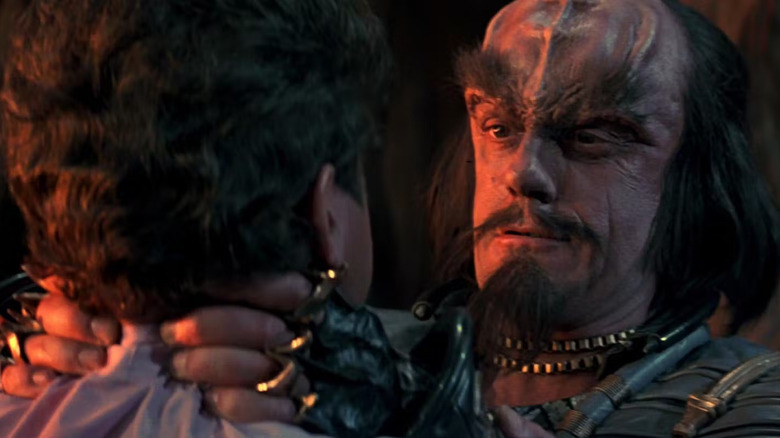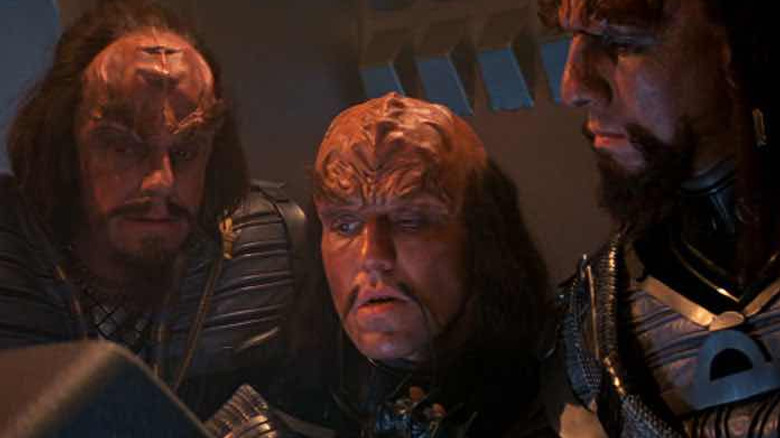It takes loads of work to create a plausible science fiction or fantasy universe, and that usually contains creating constructed languages, or “conlangs,” that work effectively sufficient for actors to talk and audiences to imagine. “The Hobbit” and “Lord of the Rings” creator J.R.R. Tolkien famously invented a number of languages for his books which were expanded upon for the films and tv diversifications, giving Center-earth an added layer of realism regardless of being such a fantastical world. Lately, linguist David J. Peterson has turn out to be a go-to conlang constructor, creating every thing from the Dothraki and Excessive Valyrian languages of “Sport of Thrones” and “Home of the Dragon” to creating a Fremen language for Denis Villeneuve’s “Dune” movies, however another unimaginable conlang creators helped pave the way in which many years earlier.
In an interview with StarTrek.com, linguist Marc Okrand shared the secrets and techniques of making the Klingon language for the “Star Trek” franchise — particularly, for “Star Trek III: The Seek for Spock.” Just some years earlier than Michael Dorn would first play Worf on “Star Trek: The Subsequent Technology” and find yourself altering Klingons all through “Star Trek” ceaselessly, Okrand planted the seeds for his or her tradition with a thought-out, albeit terrifying-sounding, language.
Okrand created a complete Klingon language from only a few phrases
Okrand defined that Klingon was first spoken in “Star Trek: The Movement Image” and that he used that handful of strains as the idea for what would ultimately turn out to be the Klingon language. (Based on Okrand, the strains in “The Movement Image” had been created by actor James Doohan, who performed Scotty, making him the unique creator of the sound of Klingon.) Okrand used the “sounds and syllables” from that first movie to create a “skeleton” of the language, then he fleshed it out utilizing a set of fundamental guidelines. It needed to include all the sounds from “The Movement Image,” sound non-English, be guttural, as that is what was within the script, and be learnable for the English actors. He began with what they wanted for “The Seek for Spock” after which later added extra, even publishing a full Klingon dictionary. At this level, Okrand has created sufficient of a Klingon language to really be fluent, and there are others who can converse the language as if it had been say, Spanish or German.
Although Klingons had appeared in “Star Trek” beforehand as villains, “The Seek for Spock” was one of many first instances they bought prolonged display screen time. The Klingon captain, Kruge, was performed by Christopher Lloyd of “Again to the Future” fame, nearly unrecognizable in his make-up, and it was as much as him to essentially get the pronunciation of the brand new and improved Klingon appropriate. So, how did he do? Based on Okrand, he nailed it.
Okrand was impressed by the forged’s dedication to talking Klingon
Regardless of doing his greatest to make Klingon simple to talk for the actors, it is a pretty difficult language to pronounce (particularly based mostly on how its spelled), however Okrand stated that Christopher Lloyd, who performed Klingon captain Kruge, was a pure:
“He was an awesome scholar. He was not solely in getting the pronunciation proper, he wished to know what the phrases meant and the way the sentences match collectively. We might work collectively just about daily they had been capturing a scene with spoken Klingon. A lot of the different audio system of Klingon within the movie had been Kruge’s crew. For essentially the most half, they’d one line apiece that they shouted out as issues had been going incorrect. I do not suppose I ever noticed a gaggle of individuals extra passionate about what to them should have been gibberish.”
Okrand additionally stated that William Shatner, who performed Captain Kirk and needed to say “beam me up” in Klingon, additionally remembered his pronunciation classes. Lately, individuals are extra more likely to keep in mind the primary Klingon greeting (Qapla’!) or its very derogatory phrase for weirdness/something Klingons don’t love, “petaQ,” creations of Okrands which have had some actual endurance within the fandom. Whereas Klingon is not as versatile as one thing like Navi from the “Avatar” movies, which allowed the actors the possibility for lots of improv, it gave “Star Trek” a complete new taste and helped make individuals into die-hard Klingon followers. (It is me. I am a Klingon fan.) majQa’, Mr. Okrand. qatlho’.



